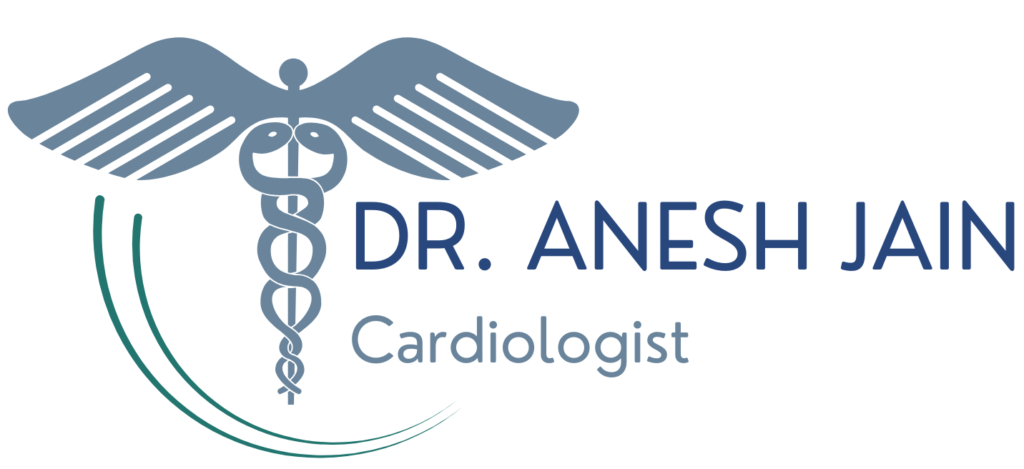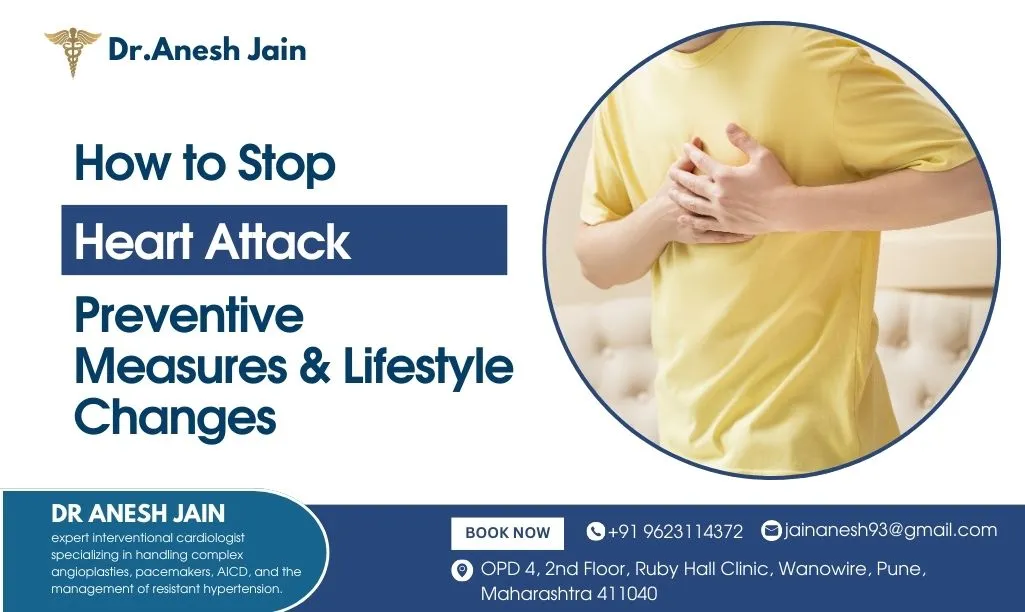How to Stop Heart Attack: Preventive Measures & Lifestyle Changes
The incidence of heart attacks is going up and is now considered by the WHO to be a modern-day pandemic. The heart disease pandemic doesn’t gain as much traction in the media as the COVID pandemic did because it is spreading slowly and the number of cases does not crop up as quickly as COVID, but the number of people dying secondary to heart disease is much higher than what we faced in COVID.
Hence, there is an urgent need to prevent heart attacks. These risk factors are physical inactivity, diet, high cholesterol, high blood pressure, diabetes, smoking, and obesity.

Adopt a healthy lifestyle with exercise
It is suggested that a healthy individual should exercise for at least 150 minutes a week (moderate-intensity exercise, ideally spread over 5–6 days a week; the best example is a brisk walk).
Exercise has a positive effect on the body as it helps control cholesterol, decreases blood pressure, decreases blood sugar, and helps maintain a healthy weight. Humans are, by nature, built for an active lifestyle; however, the modern lifestyle has made us sedentary, which is one of the root causes of premature heart disease.
Related: 7 Warning Signs You Need to See a Cardiologist

Diet
This includes what to eat and how much to eat. It is advisable to avoid packaged and processed foods as much as possible, as they have an excess of salt and sugar in them, both of which are detrimental to your heart health. Home-cooked food is different from eating packaged food at home.
Eating foods with a high fiber content is usually recommended. Foods rich in antioxidants, like nuts and fruits, help maintain long-term goals of a healthy lifestyle.
Portion control is equally important. The usual recommendation is to have three full meals a day.

Maintaining adequate control over blood pressure, sugars, and cholesterol
It is recommended that if you are suffering from either hypertension, diabetes mellitus, or high cholesterol, you should be in close follow-up with your physician or a cardiologist to keep a check on your risk factors so that they do not affect your heart health.
According to internationally recommended guidelines, your blood pressure should be less than 140/90 mmHg, HbA1c <7% (for diabetes), and LDL cholesterol <90 mg/dl.
Related: How to Stop Taking Blood Pressure Medication Safely

Tobacco Consumption
Tobacco consumption in any form is harmful, especially to the cardiovascular system, as it increases the chances of having a heart attack by up to five times. Total abstinence from smoking and all tobacco products is a must to stop heart attacks.

Alcohol Consumption
Although some studies have shown that alcohol has a protective effect on heart health, in reality, especially for Indians, it has not been translated into actual benefits.
Alcohol promotes weight gain and alters unfavorably one’s cholesterol profile; thus, it is recommended to abstain from alcohol, especially binge drinking. Unfortunately, no studies have shown the benefits of alcohol consumption in the Indian race.
Family History
The incidence of heart attacks or detection of blockages in parents or siblings at an age of fewer than 50 years is a red flag for an individual to get themselves evaluated regularly as heart disease is genetic.
If you have a close blood relative suffering from a cardiac illness, it is wise to meet a cardiologist to get yourself thoroughly evaluated and to start appropriate therapy to prevent any complications.

Role of Health Check-ups
A lot of hospitals and clinics have started to offer yearly health check-ups as a blanket to label someone “fit or unfit.” Although health checkups help in diagnosing asymptomatic conditions like high blood pressure, diabetes, and increased cholesterol levels, not all health checks are scientifically accurate.
Maintaining an active lifestyle with a baseline health evaluation after the age of 40 (for people who have no underlying health issues) is a good strategy to begin with. Younger individuals turning up for health checkups offer little or no help in most of the cases.
Health checkups should include a 2D echo, a treadmill test to look at your cardio-vascular fitness and blood tests for sugar, cholesterol, thyroid, vitamin D3, and B12 levels, a hemogram, and renal function tests as a bare minimum. Some blood tests done, such as heavy metal analysis in the body, are a waste of time, money, and resources.
Conclusion
In summary, to maintain a healthy heart and avoid heart attacks, a healthy, productive, and active lifestyle with a scientific approach to health checkups is the way to go forward.
Dr. Anesh Jain is the best cardiologist in Pune. His unparalleled expertise in cardiac care sets him apart. Book an appointment today to experience world-class heart care.










7 Warning Signs: When It's Essential To See A Cardiologist
July 16, 2024[…] Related: How to Stop Heart Attack: Preventive Measures & Lifestyle Changes […]
Angiography Vs. Angioplasty: Which Is Right For You?
July 16, 2024[…] Related: How to Stop Heart Attack: Preventive Measures & Lifestyle Changes […]
How To Stop Taking Blood Pressure Medication Safely
July 16, 2024[…] Related: How to Stop Heart Attack: Preventive Measures & Lifestyle Changes […]
What Causes Heart Attacks At A Young Age?
September 12, 2024[…] Related: How to Stop Heart Attack: Preventive Measures & Lifestyle Changes […]